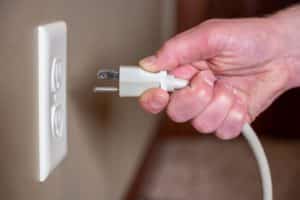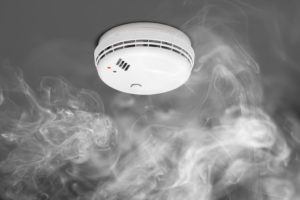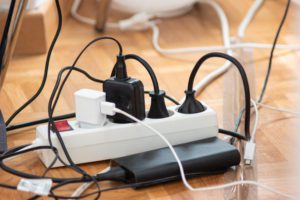May is National Electrical Safety Month
Our home’s electrical systems are largely “out of sight, out of mind,” and we may not give them much thought until something stops working or goes wrong. National Electrical Safety Month is the perfect time to be proactive and check on the status of the electrical safety of your home. Here are some of the most important things to check:



Eight Keys to an Electrically Safe Home
- Proper use of extension cords. Extension cords are safe for temporary, short-term use. However, they are not meant to be a part of regular home wiring. Whenever possible, plugs should go directly into a wall outlet or surge strip. Over-reliance on extension cords is a sure sign that your home could be made safer by adding receptacles or circuits.
-
Tamper-resistant receptacles. Tamper-resistant receptacles work like regular receptacles, but have built-in spring-loaded plastic flaps that only open when equal pressure is applied. They are designed to keep young children from poking items into an outlet. They are the most effective way to childproof receptacles and prevent children from electric shock. In fact, researchers at Temple University found that 100% of 2-4 year olds were able to remove plastic outlet caps within 10 seconds. If you have young children living in your home or visiting regularly, tamper-resistant receptacles are a safety priority.
-
Shock-prevention protection. Ground Fault Circuit Interrupters, or GFCIs, are special receptacles or circuit breakers that quickly cut off power if they detect that someone might be getting shocked. For electrical safety, your home should have GFCI protection wherever electricity and water are near each other. Receptacles in kitchens, bathrooms, laundry areas, garages, exterior locations, and basements should all have shock-prevention protection.
-
Fire-prevention protection. While GFCIs help prevent people from getting electrical shocks, Arc-Fault Circuit Interrupters (AFCIs) help prevent electrical fires. AFCIs are usually located at the circuit breaker (on the main electrical panel of your home), and they constantly monitor the circuit for arcing or sparking on the wiring in the home. The Consumer Protection Safety Commission estimates that 50% of electrical fires can be prevented by installing AFCI protection.
-
Smoke alarms. Smoke alarms save lives. House fires, and the smoke they create, spread quickly. Smoke alarms give you those crucial extra moments to escape in event of a fire. Smoke alarms need to be replaced every 10 years. The detection devices in smoke alarms break down over time and lose their ability to detect smoke. Ideally, smoke alarms should be hardwired and inter-connected so that when one unit alarms, they all alarm. There should be at least one smoke alarm on every floor of your home, and one in each bedroom. Smoke and carbon monoxide combination alarms are recommended for hallways outside of bedrooms. There are now even smart smoke alarms that connect to your phone, and alarms with 10-year lithium-ion batteries so they don’t wake you up at night to remind you to change the batteries!
-
Electricity not working or acting strange. Whether it’s flickering lights or an outlet that is no longer working, small electrical inconveniences can actually be a symptom of a bigger problem. There may be loose connections that could eventually start a fire, or damage at your main electrical panel, or an outlet that has already started to burn. Whether the issue seems major or minor, if your electrical system is not functioning properly, it should be evaluated by an electrician.
-
Grounding. Proper grounding is key to making sure that any stray electricity, whether from faulty equipment or a nearby lightning strike, has a pathway back to the earth. In a home without a proper grounding system, people are more likely to be shocked or even electrocuted, and equipment is more likely to be destroyed. If your home was built before 1970 and has not been electrically updated, or has two-prong receptacles, there is a good chance it does not have proper grounding.
-
When in doubt, check it out. If you suspect that the electrical system in your home is faulty or unsafe, have it checked out by an electrician. Maybe you have reason to believe that your home was electrically altered by a less-than-qualified previous homeowner, or that your home’s builder took shortcuts that might not have been fully safe or up to modern code.
The Bonfe Basics™ and Bonfe Plus™ Membership Plans include a no-cost electrical inspection as part of the plan. Whether there are safety upgrades you know you want for your home, or issues you want to have checked, Bonfe has the electricians to get the job done.
To schedule and appointment with a Bonfe Electrician, click here
